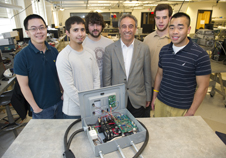Students design system to power down home appliances

Excess home power usage can send individuals’ energy bills through the roof and often leave utility companies scrambling to relieve pressure on the grid. So Northeastern University students devised a home energy-control system that monitors power levels inside a particular home — or even throughout an entire apartment building or neighborhood — potentially saving homeowners cash and helping to prevent widespread blackouts.
The students, electrical and computer engineering majors Luca Cavallo, Allen Chan, Martin Green, Khanh Lam and Egin Tollkuci, developed the system for their senior capstone project. These projects provide engineering students with a rich experiential-learning opportunity, enabling them to pursue their innovative ideas through use-inspired research at a level of complexity more typical of graduate studies. Professor of Electrical and Computer Engineering Bahram Shafai served as the students’ advisor.
Look around your living room or kitchen, the students said, and you’ll find countless appliances plugged in continuously, from TVs and stereos to dishwashers and toasters. While these items may be turned off, they remain in stand-by mode and draw power for hours, even as their owners are at work or asleep. The cable box is a prime culprit, for example, because it continually updates the channel guide.
“People think that when they hit the power button and [an applicance] turns off, it’s not doing anything,” Cavallo said. “But really that’s not true. It still uses quite a bit of power.”
That’s where the student’s innovative system comes in. They’ve designed a breaker box with an LCD screen and keypad that allows users to see how much power is being used in a particular room or even by a specific appliance. The keypad also enables them to set rooms and appliances at varying priority levels, determining when to shut them down during the day or night.
“You designate which areas of the house are low-priority, and it would completely shut those off. That way, you would reduce leakage current overnight,” Tollkuci said.
Tollkuci and his team members said their technology could not only lower energy bills for consumers, but also provide energy companies with the ability to detect potential blackouts. If installed in homes or apartment complexes throughout a neighborhood, overall energy usage could be monitored and reduced in all of the units if the power load being drawn from the grid is nearing a dangerous level, the students said.
There is even a natural gas sensor built into the system, so if a gas leak were detected inside a home, the power would be shut off to prevent a possible explosion.





